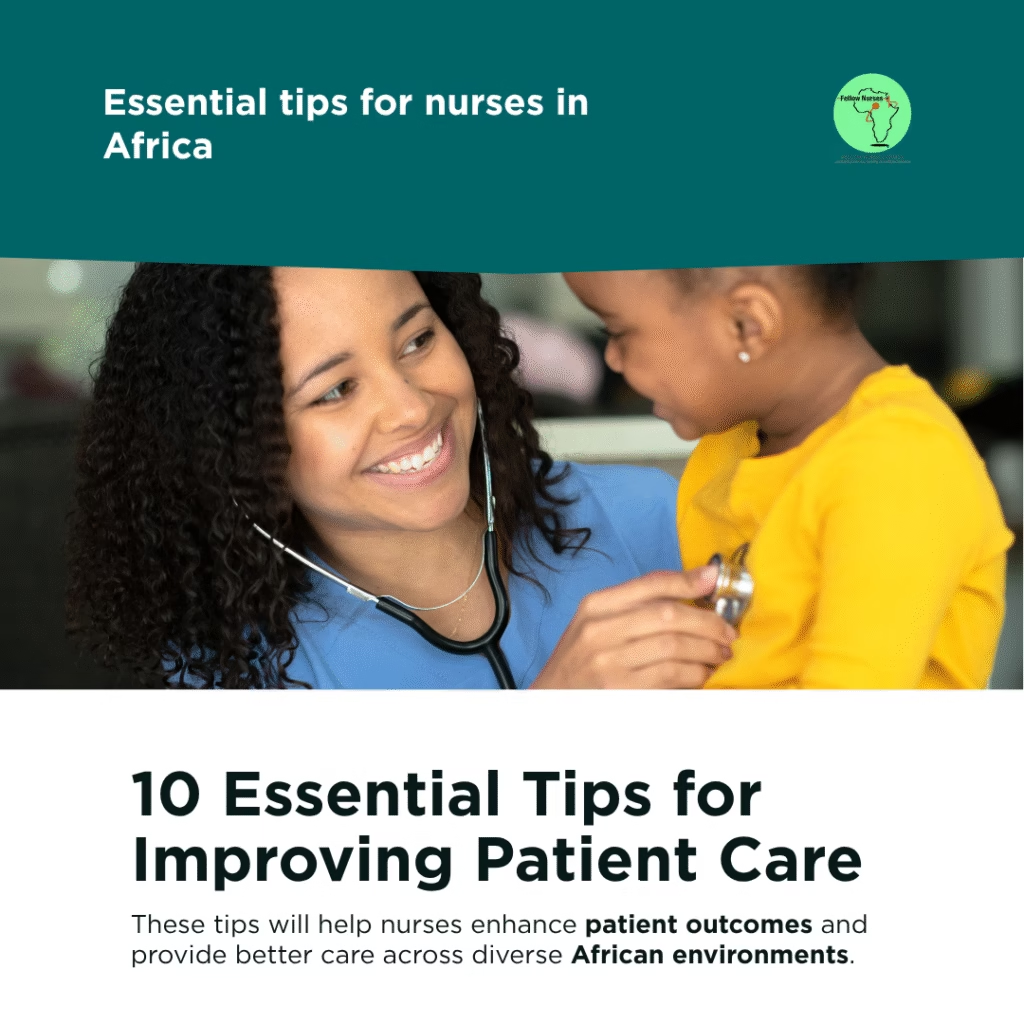Fellow Nurses Africa Blog | 5July 2025
10 Essential Tips for Nurses to Improve Patient Care in Africa – written by Ifunanya Stella Ndu
In Africa, particularly in Nigeria, nurses are the heartbeat of our healthcare system. Working in under-resourced and high-demand environments, we face unique challenges that test our resilience and dedication. Yet, our role is pivotal in transforming patient care.
Improving patient outcomes doesn’t always require advanced technology—it begins with practical strategies, mindset shifts, and a commitment to excellence.
Here are 10 essential tips to help nurses across Africa elevate patient care, tailored to our unique context.

1. Prioritize Effective Communication
Clear, compassionate communication builds trust and ensures patients understand their diagnoses, treatments, and potential side effects. Use local languages whenever possible, avoid complex medical jargon, and involve patients’ families to enhance understanding and compliance. Effective communication fosters stronger nurse-patient relationships, a cornerstone of quality care.
2. Stay Informed with Continuous Education
Healthcare evolves rapidly, and staying updated is crucial. Seek out workshops, post-basic programs, online courses, or hospital seminars to expand your knowledge. Focus on critical areas like infection control, maternal health, mental health, or chronic disease management. Continuous learning empowers nurses to deliver evidence-based care, even in resource-limited settings.
3. Advocate for Patients’ Rights
As nurses, we are our patients’ biggest advocates. Protect their rights to dignity, confidentiality, and informed consent. Speak up for better medical supplies, improved working conditions, or timely referrals when resources are scarce. Advocacy ensures patients receive the care they deserve, despite systemic challenges.
4. Embrace Cultural Sensitivity
Africa’s rich cultural diversity demands culturally competent care. Understand local customs, religious beliefs, and traditional health practices to deliver respectful, personalized care. Ask patients about their beliefs rather than making assumptions, as this reduces resistance to treatment and fosters cooperation.
5. Master Basic Life-Saving Techniques
In settings where technology is limited, manual skills are lifesavers. Excel in techniques like accurate blood pressure monitoring, wound dressing, and emergency first aid. Precision in these fundamental skills can make a significant impact, proving that basic care often outweighs the need for advanced equipment.
6. Emphasize Hygiene and Infection Control
In crowded wards or rural clinics, infection prevention is critical. Simple practices like handwashing, proper glove use, and safe disposal of sharps into safety boxes can prevent cross-infections. Educate patients and families on hygiene practices to reduce infection risks and promote healthier communities.
7. Leverage Community Health Knowledge
Many African nurses serve in rural or underserved areas. Understanding local disease patterns—such as malaria, typhoid, diarrhea, chickenpox, or tuberculosis—enables better screening, prevention, and health education. Collaborate with community health workers to extend your impact through effective outreach programs.
8. Practice Empathy and Emotional Support
A warm smile or a few kind words can ease patient anxiety and build trust. Take a moment to listen, even briefly, to create stronger bonds with patients. Emotional support is a vital part of healing, encouraging better cooperation and improving the overall patient experience.
9. Optimize Documentation and Reporting
Accurate, timely record-keeping ensures continuity of care and prevents medical errors. Even without advanced technology, neat and complete manual documentation is invaluable. Proper records protect patient safety and uphold your professional integrity, while also helping identify health trends.
10. Foster Collaboration with Healthcare Teams
Strong relationships with doctors, pharmacists, lab technicians, and other staff enhance workflow and decision-making. Respectful collaboration in high-pressure settings strengthens the healthcare system, ensuring better patient outcomes through shared expertise and teamwork.
Conclusion
In African healthcare systems, where challenges often outweigh resources, nurses are the backbone of patient care. By focusing on effective communication, cultural competence, continuous learning, and compassion, we can overcome barriers and make a lasting impact. Every patient interaction is an opportunity to provide not just medical care but also emotional and cultural support. Let’s continue to empower ourselves and each other to deliver exceptional care across Africa.
Fellow Nurses Africa is the independent voice of African nursing, we educate, inform, and support the nursing profession.










